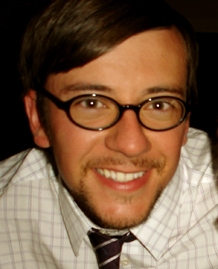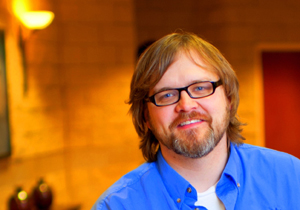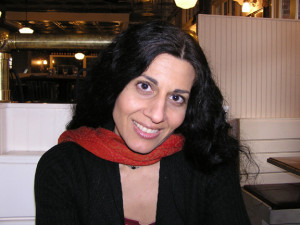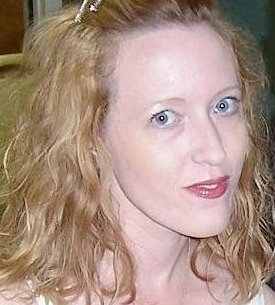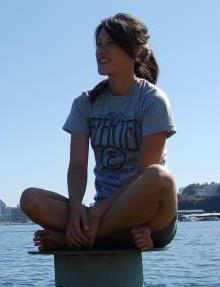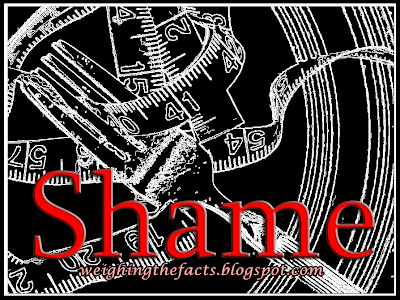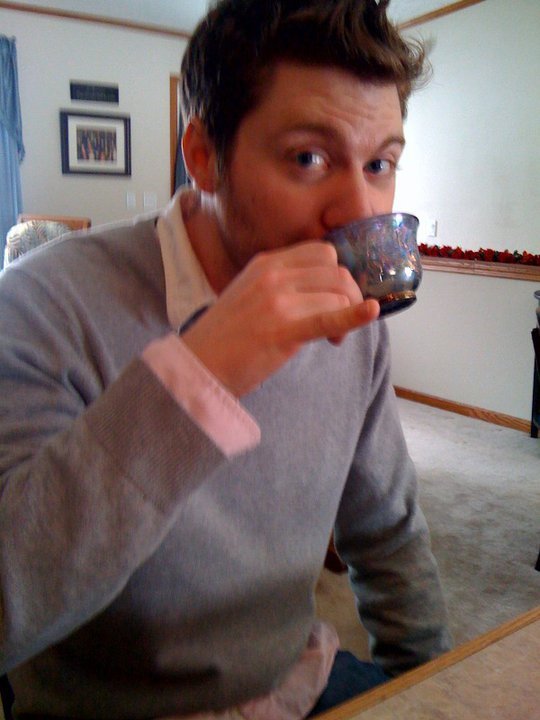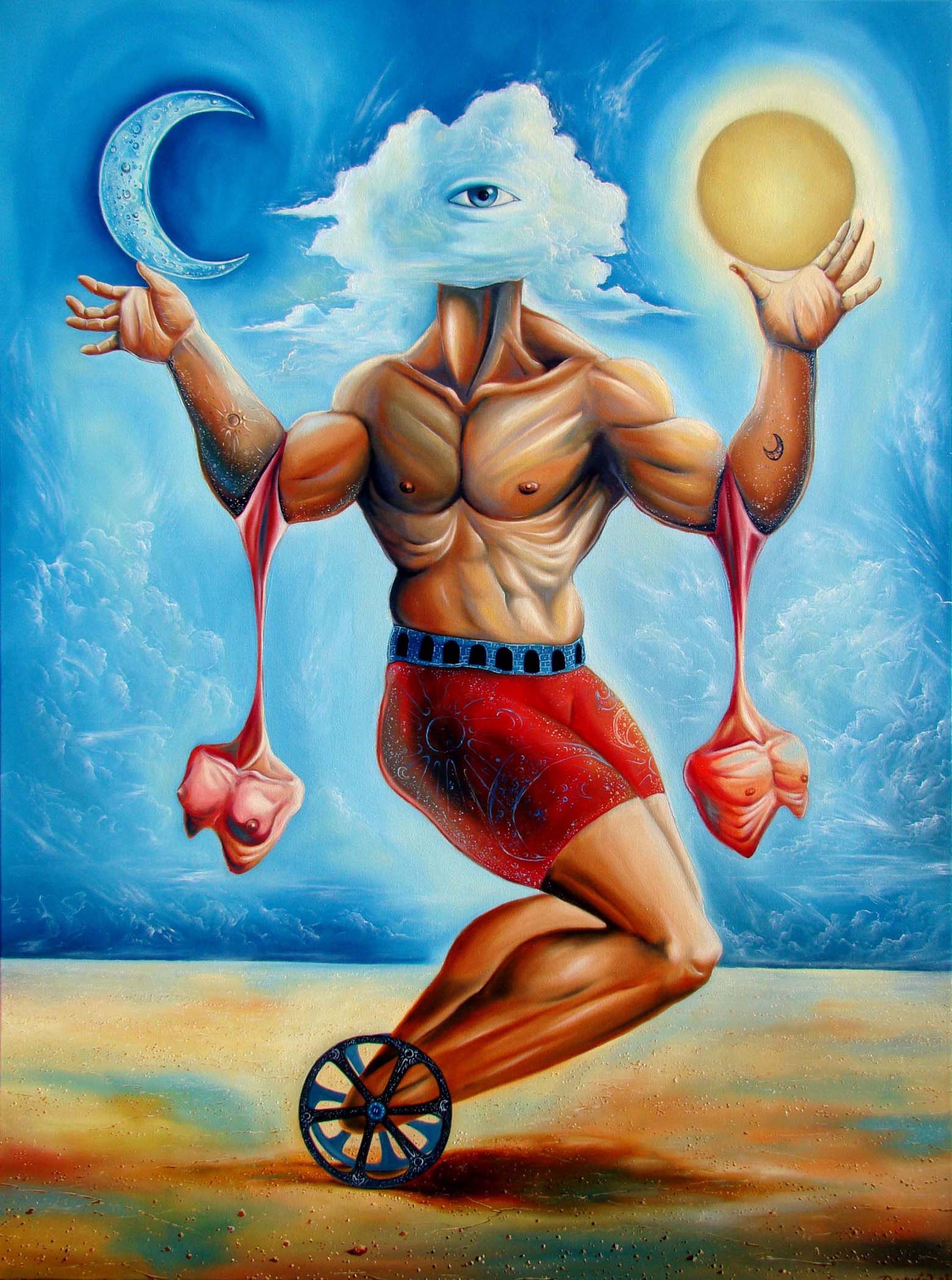
Mary Akers: I love the use of sensory details in your essay Watermark. You write them so well. Are these details that you consciously add to enhance your writing, or do you find your memories are tied up in sensory details?
Pat Heim: What comes to mind is a line from Longfellow’s poem “The Arrow and the Song,” which resonated with me the moment I first read it as a third or fourth grader in Catholic school: “For who has sight so keen and strong, that it can follow the flight of song?” I identify with the yearning in this question and the sense of searching for something as ephemeral as a song. But I’m definitely the sensing type, a hunter-gatherer, nourishing myself on what I scavenge through my sensory apparatus, clamoring to see, hear, smell, and touch anything and everything that captures my attention. In the fall, when I catch a whiff of someone burning leaves, I quickly lower the car windows and inhale deeply and blissfully. I’m easily over-stimulated, intoxicated by the elements in my sensory field. I never thought about this before, but I think maybe the memories are tied up in the sensory details. As a child, the caboose of seven children, I created a little bubble for myself, a parallel universe in which I could retreat from the rough-and-tumult of five noisy older brothers, a big sister, and parents who were busy and often distracted. During the week, when my dad was at work and my siblings, at school, it was just my mom and me at home.
She had a playful, easy-going way, but was often preoccupied. I appreciated that she was a warm body in the house yet open to my intermittent bouts of chatter. The sounds and smells generated just by her cleaning or making dinner were reassuring and comforting, and all of these sensations do remind me of her. Her quiet presence gave me a sense of security, and I think mine gave that to her. My earliest favorite pastimes were reciting poetry, singing, especially while swinging, and pretending I could speak French. I also liked sitting at a desk and scribbling in old composition books, as if I were taking notes. I loved the musicality of words and often felt elated in the presence of nature’s sights, sounds, textures, and smells. I became adept at using what I had and relying on myself, seeking and finding solace in the sensory world of the outdoors as well because it, too, transported me to a tranquil place that held me, like a mother does.
I begin almost every piece of writing by mentioning another person or by personifying something, and then I usually describe a thing or phenomenon in the environment with whatever amount of exactitude I can garner. I’d say that I do this automatically, not conscious of why. I think I’m remembering the feeling of being held in order to prepare myself and my readers for the painful material to follow as in “Let me tell you something kind before delivering the bad news.” The leap into the unknown is anxiety provoking, so I might also be reaching out to someone or something beautiful and tangible because the internal world, where all the words, memories, and ideas reside is fraught with feelings, some of them threatening, perhaps even dangerous. Beauty holds my hand and keeps her eye on me.
MA: What type of things/occurrences/ sensory details take you back to this difficult time in your childhood that you’re writing about?
PH: Firstly, everything related to house and home because that is where I spent ninety percent of my time with my mother. I was recently paging through a book written by an architect, specializing in creating small spaces. I was struck by the psychology informing these theories of design. Spaces are essentially for shelter and containing and must provide a sense of organization, all the things mothers must do. I’d also have to say fabric. In the weeks and months after my mother died, I’d often retreat to her closet, fondling her clothes, slipping my feet into her shoes. I’d bury my face in her coats and dresses as if to extract the last remaining vestiges of her essence. Things that glitter, like jewelry, take me back as well. When she was sick, I snuck into her room and stole some of her necklaces and bracelets, a scene I depicted in the essay, whereupon she woke up and chastised me. I love wearing jewelry and sometimes pour over jewelry catalogues and then throw them away without ordering a single item. It’s as if I still feel a bit guilty for having surpassed my mother, who refused to grant me her permission.
Also, my mother got sick and died in late summer. I can recall several moments around that time, such as when my father brought her home from the hospital and I realized just how ill she was, that the world ground to a halt because I, myself, froze. Yet, the silence of nature that morning was profound; the sweltering heat and the scent of the still-green grass and overgrown summer foliage have stayed with me until this day. Sometimes, when the world outside grows that quiet, I experience a great void in my heart.
Any loss in my present life, at least to some extent, becomes imbued with feelings from that time. In fact, this is how I’ve been able to remember, because these feelings are often actual memories. What I’ve learned to do in analysis is to sort those pertaining to the past from those in the present, so that the here-and-now can be experienced for what it is; unencumbered by feelings from the past.
MA: This past Mother’s Day, I suddenly understood that many people have a very complex relationship with that day. What is your Mother’s day like?
PH: My initial reaction is to state that I’ve never been very affected by Mother’s Day. Yet, when I pause to think about it, this isn’t quite true. Perhaps this is because, shortly after my mother died, I began to detach myself from my feelings and memories of her, affording myself a sense of control over the randomness and chaos of life. The price I paid was to feel terribly guilty though I didn’t know why, as I’d carried out my solution unconsciously. And though I didn’t realize it, I’d cut myself off from myself as well. This must sound callous, but it’s how I held myself together. Trauma overwhelms and renders us helpless. The feelings are gargantuan; there is no way the mind can deal other than by recruiting such massive defenses. When all was chaos, even God sorted with a heavy hand.
My father was grief-stricken and, in a way, spiritually absent. My siblings had all left the nest, and I felt like a different person than I’d been before my mother died. I no longer knew
who I was. So, although I’ve felt blessed as an adult to be a mother on Mother’s Day, my experience of having had a mother feels distant, as if from another time. Yet, at the Hallmark store, when I read beautiful cards from daughters to mothers, a bitter, fleeting sorrow catches hold of me, because I haven’t seen or wished my mother a Happy Mother’s Day in forty-some years. I long to buy one of those cards and mail it to her. Little by little, however, I’ve been piecing myself back to my mother, but the memory of feeling as if I were falling apart keeps me, even today, from stepping too close to that flame.
MA: Did you find it difficult to write such a deeply personal essay? What techniques as a writer do you use to make it easier to approach a sensitive or personal subject?
PH: I never would have been able to write from such a feeling place, especially on this particular subject, had I not gone into analysis. I was reluctant to “elaborate,” as my writing mentor would say, to “flesh things out.” I didn’t want the word to be made flesh, which is a Christian metaphor. I preferred the abstract realm of ideas. Elaborating requires being in touch with oneself, of having access to a very deep and oft-times frightening place. One must sense a holding presence from within in order to take such a leap into the dark. My experience of losing my mother was extremely traumatic, disrupting my loving ties both to her and parts of myself. Although I didn’t know this consciously, the feelings emanating from that loss, although normal, were intolerable and numerous; tremendous sorrow, guilt, shame, rage, and even hate, to name a few. They overwhelmed me and disorganized my mind. A thirteen-year-old girl’s relationship with her mother is highly ambivalent. To hold such potent and disparate feelings together in order to mourn that loss is impossible without the help of a caring adult who can tolerate a child’s chaotic inner world. Most adults would like to believe that children have some sort of protective mechanism to shield them from agony.
The analysis has helped me to access these feelings and, over time, develop the ability to tolerate them. My internal world is no longer so frightening a place. My ego has been freed up to a considerable extent, and I continue to strive for even greater freedom, to grow more adept at roaming the creative realm, experiencing it as a safe playground of the mind as opposed to defensively retreating from it, as if it were a dungeon, haunted by the villainous creatures that populate our nightmares, our own unwanted feelings and memories.
MA: What sort of reading did you do as a child?
PH: This might sound provocative, flying in the face of what we tend to believe about the development of intelligence, but I don’t recall reading a lot as a child, or at least I didn’t read very many books. Yet, my father was an avid newspaper reader, my mother preferred women’s magazines, at least insofar as I remember, and the brother who was closest in age to me devoured comic books as if they were penny candy Before I learned to read, my mother would buy me Golden Books at the grocery store, usually when I was sick, and she or my father would read them to me. I also think she might have recited nursery rhymes to me. I didn’t attend kindergarten, and there were at least seventy students in my first-grade class. I could read a little by then as I’d enlisted two older girls in my neighborhood to school me in some basic reading, writing, and arithmetic. Learning to read was a joy, and I soon discovered that I could read aloud, seamlessly, feeling rather indignant toward my classmates who stumbled over pronunciation. I also enjoyed reading my school books to my mother, as I mentioned in my essay. Even now, when I discover something beautifully written, I often read it aloud to myself and commit part of it to memory. I could spend a few hours every day, if I had the time, reading aloud to some willing, appreciative listener.
In Catholic grade school, we were required to study poetry and memorize poems. I developed a ritual of coming home from school that first day, sitting down at the dining room table, and reading the poetry text cover to cover. Often I had the poems memorized long before they were assigned. Although I’m acrophobic, I’ve hiked and skied a few steep trails with my husband and children. When the anxiety and near-panic set in, I immediately fall back on reciting those poems.
When I hear my friends talking about all the Nancy Drew books they read when they were growing up, I feel estranged, as if I’d descended to earth from the planet of the illiterate. I wonder who I’d be or how I’d write today had I read more books as a child. In college, I majored in French and minored in English, and though I enjoy fiction I mostly read memoir. Every ten years, I re-read The Great Gatsby, my favorite book of all time. I once heard that F. Scott Fitzgerald had perfect pitch. I couldn’t agree more.
MA: And finally, what does “recovery” mean to you?
PH: For me, the process of recovery means reclaiming the parts of myself I lost, especially when my mother died but also when my father died four years later. In reclaiming my feelings, my memories, and the parts of myself that felt unacceptable to me as an adolescent, which are many for all of us when we’re honest about it, and by understanding them and welcoming them back into the fold of my identity, I’ve reclaimed the continuity of my sense of myself, enabling me to tell my story.
I’ve also reclaimed my adolescent development because, without a way to mourn and a healthy parent with whom to relate, that development got derailed in terms of my ability to become more separate and individuated, to deepen my capacity for intimacy, and to consolidate my identity, which requires being knowledgeable about and accepting enough of one’s self and one’s strong feelings, particularly competitiveness and aggression, to choose one’s life path and purpose with conviction.
This was particularly difficult for me because at the time I was separating from my mother and becoming a woman, competing with her as adolescent girls are programmed to do, she died. As I stated earlier, I feared I’d stolen her womanhood, the jewels of her capacity to procreate, and that my ambition to become a woman, my normal competitiveness and aggression had destroyed her. Her disapproval and chastisement when she caught me stealing her jewelry affected me deeply. I had no right to become a woman. I’d distanced myself from my feelings for and memories of her, which felt destructive, though I hadn’t chosen this so much as it resulted from the trauma. Yet, the belief that I had done so afforded me a sense of power over fate and helped to organize my mind. What I’m celebrating now is how I’ve recovered and deepened my creativity because I’m no longer fearful of my mother’s retaliation, and I’m not defending myself so much against overwhelming, potentially disruptive feelings.





